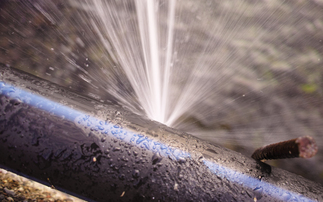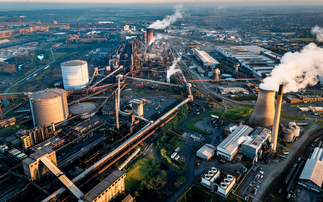The Transport Secretary is betting the farm on hydrogen trains, the problem is he appears to have no plan for delivering them
There is a small but vibrant cottage industry amongst the UK's political commentariat dedicated to documenting and explaining the on-going mystery that is Chris Grayling's ministerial career.
It may not be quite as perplexing as the assumption in some quarters that Dan Hanaan is a political philosopher every bit the equal of Burke and Locke. Nor is it as big a source of national embarrassment as the great imponderable that is the Foreign Secretary's continued employment. But it is a mystery all the same, and one with plenty of evidence to rake over.
Exhibit A is the track record established during Grayling's time as Justice Secretary, when all but one of the UK's youth offenders' centres were deemed unsafe, legal aid was cut and restricted for many of those who needed it most, court fees were introduced that effectively incentivised innocent people to plead guilty, and it was agreed the UK would sell prison services to the paragon of humane justice systems that is Saudi Arabia.
Best of all from a satire perspective and worst of all from a basic human decency perspective there was Grayling's auto-parodic move to ban prisoners from being sent books. The High Court ruled that one unlawful.
Upon replacing Grayling as Justice Secretary Michael Gove set about reversing many of his predecessor's decisions with a haste that must have made subsequent Cabinet get togethers a touch awkward.
And yet, the ministerial exploits of 'failing Grayling', as he is not so affectionately known, somehow continued. He managed to earn the moniker of 'prominent Brexiteer' - despite managing to get through the entire referendum campaign without providing a single memorable moment - and then ran Theresa May's leadership campaign, securing himself yet another plum Cabinet post in the process, this time as Transport Secretary.
Given the Department for Transport's crucial environmental brief, you would have expected Grayling to have quickly found himself in the cross hairs of green businesses and campaigners. But for a variety of reasons - Heathrow expansion taking up its perennial position in the longest of long grass, Grayling's political compass telling him it is not worth engaging with the game-changing clean tech revolution underway in the auto industry, the fact there is a lot going on at Defra and BEIS - the Transport Secretary has kept a surprisingly low profile.
However, this week there was a reminder of why green businesses and campaigners really should be paying attention to what is happening at DfT under Grayling's watch - or, much more accurately, what is not happening.
A few days ago Grayling was hauled back before the Transport Select Committee to answer further questions on the government's decision to scrap a number of major rail electrification projects, after MPs were left decidedly underwhelmed by his initial attempt to justify his decision.
Having already served in a Conservative government that blatantly breached a 2015 manifesto pledge by shelving one wave of promised electrification projects, Grayling last summer confirmed plans to modernise the Midland mainline, the line from Cardiff to Swansea, and tracks in the Lake District were to be ditched.
The environmental repercussions of the decision are likely to be considerable, especially when you consider that diesel trains are a source of air pollution and transport remains a both a major source of greenhouse emissions and an area where the UK's decarbonisation efforts are making scant progress. As the Committee's Chair Lilian Greenwood put it this week, scrapping electrification projects raised "serious questions about the government's willingness to invest in the long-term future of our railways and their commitment to the decarbonisation of transport".
But Grayling defended the decision, insisting environmental benefits would soon emerge from the government's rail upgrade programme.
"Spending £500m to enable the same trains to travel on the same track, at the same speed, isn't a terribly good use of taxpayers' money," he said, adding that the government should instead focus on the emergence of bi-mode trains, which can seamlessly switch between running on diesel and electric.
"With bi-mode trains you're getting all the passenger benefits without any of the disruption, no passenger's travel experience is going to be worse by using bi-mode trains," he said. "I've talked to senior people in the industry who believe there will only be one generation of diesel engines on the bi-modes and the second generation will be hydrogen engines. We're looking now to try and get the first hydrogen trains on our network… Battery trains now are becoming a real possibility."
His evidence echoed comments in the Commons last week, where he said he expected "to see a transformation of technology on our railways over the coming years, with the introduction of different types of battery electric hybrid trains, and I see that as a priority… I want the first hydrogen trains to operate on our rail network within a short period of time."
All of which sounds great and perfectly reasonable, until you ask how, precisely, is the government looking at getting hydrogen trains on to the network? What, exactly, is the Secretary of State doing to make sure the first hydrogen trains are operating as quickly as physically possible?
Because I asked the Department for Transport these questions this week, and the answers were... frustrating. Not as frustrating as being locked in a room without any new reading material, but frustrating all the same.
It is worth addressing Grayling's points one at a time.
He may be right to say "no passenger's travel experience is going to be worse by using bi-mode trains", but the same is not true of anyone living near the rail lines or anyone who cares about climate change. For them the emissions from the continued use of trains with diesel engines will be demonstrably worse than for pure electric trains, even if the bi-mode trains can make use of electric overhead cables where they are available.
Moreover, Grayling may also be right to claim some people in the industry are supportive of bi-mode trains - although presumably these are the same people who make bi-mode trains. However, the technology is not held in universal high regard. As the New Statesmen noted this week, evidence to the Select Committee from Roger Ford, industry and technology editor at Modern Railway, stated that electric trains offered better "operating costs, environmental impact, energy efficiency, reliability and passenger comfort".
"To be blunt, the claim that bi-mode trains will provide passengers with the same quality of service is a face-saving attempt to justify cancellation of the onward electrification from Cardiff to Swansea," he added.
It's not an unreasonable conclusion when you also consider that for all their long term benefits any electrification plan would have resulted in significant disruption to lines during the upgrade period. Disruption that would have seen the Transport Secretary's name used as a curse word by weekend travellers stuck on rail replacement bus services for years to come. Grayling's decision to cancel the projects may do significant long term harm, but a cynic would argue that it comes with a sizeable short term political benefit.
In declaring that his decision had saved passengers "years of delays", Grayling came dangerously close to revelling in the benefits of this short termism.
However, the real scandal here is to be found not in the shelving of the electrification plans but the glaring inadequacy of the replacement plan. It is over six months since the electrification plans were scrapped, during which time Grayling has repeatedly argued bi-mode and hydrogen trains are a credible alternative.
So, I asked the Department for Transport what work was underway to develop, trial, and then deploy these new technologies that are, by definition, absolutely critical to both the future of the rail network and the UK's carbon targets. The answer, and I somehow doubt this will surprise you, is staggeringly little. The Transport Secretary apparently wants the first hydrogen train on our network within a short period of time, he's just not yet got round to drawing up a plan and assigning some funds to ensure that actually happens.
In fairness, there are a handful of projects dotted around that could be stitched together in defence of Grayling's vision. Vivarail and Alstom have tested some hydrogen powered rolling stock, and proposals have been floated for a first UK trial near Liverpool that would make use of hydrogen produced at local industrial facilities.
But this is early stage stuff, and as far as I can tell DfT's role currently appears to be limited to encouraging operators to investigate the use of more environmentally-friendly trains and expressing interest in the trialling of new technologies.
In stark contrast with the various recent environmental commitments from Defra and BEIS, there are no target dates for phasing out high carbon trains, no trumpeting of new innovation funding, no trials currently confirmed, and no explicit acceptance that the current situation is both harmful and unsustainable.
It is, in short, a scandalous mess. Having conceded the importance of hydrogen trains it is hard to explain the failure to advance plans for their deployment - again, I did ask if any such plans were in development. The only possible explanation can be cynicism or incompetence, right? It looks suspiciously like another exhibit to add to the on-going mystery of Chris Grayling's ministerial career.
Just to be clear, hydrogen trains could prove to be an effective answer to the problem presented by dirty diesel trains. Hydrogen has plenty of low carbon benefits. It can be produced using excess variable renewable power, it can play a role in the decarbonisation of road transport, rail transport, heating, and perhaps one day even aviation, it can be stored for long periods, and it can be integrated relatively easily into current refuelling models and infrastructure. There are lots of reasons to welcome the government's interest in the technology.
But if a Secretary of State is serious about realising these benefits and making hydrogen the future fuel of choice for much of the rail network then they need to provide a coherent, credible, and fast-tracked plan for delivering fuel cell powered trains and supporting green hydrogen production and distribution infrastructure. Because the failure to do so is to condemn the UK to a continued reliance on dirty, unreliable 20th century trains at a time when we are meant to be decarbonising key infrastructure as quickly as possible. If Grayling is unable or unwilling to produce such a plan, then he should have simply stuck with the existing plan to electrify the network.
The problem is that perhaps the biggest mystery of Grayling's career is why anyone would expect a coherent, credible, and fast-tracked plan on any topic, especially when there is the potential to avoid some short term political pain with a slap-dash, under-funded, and under-researched punt instead. The mystery continues, and there are no signs it will be resolved any time soon.











